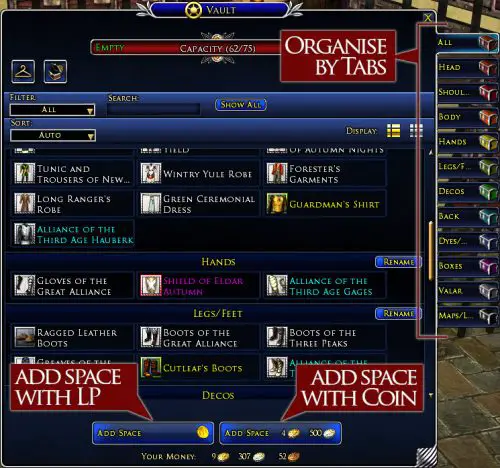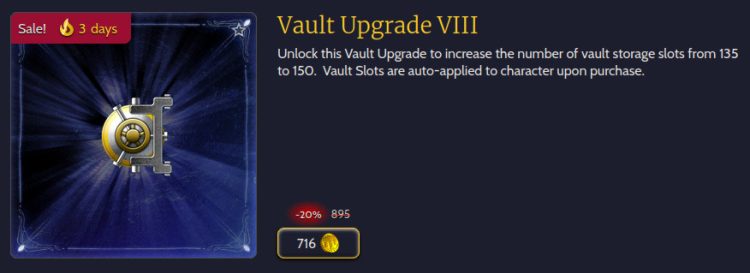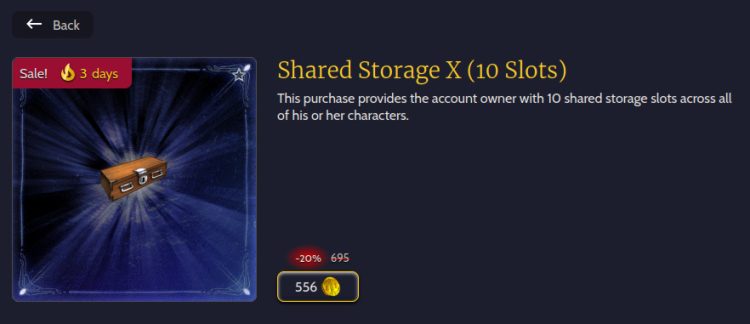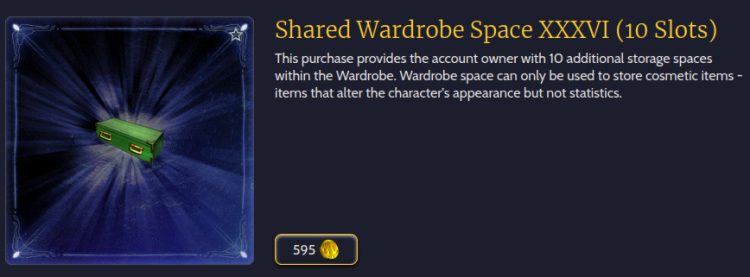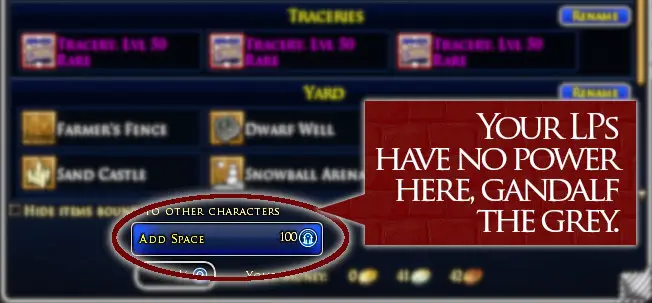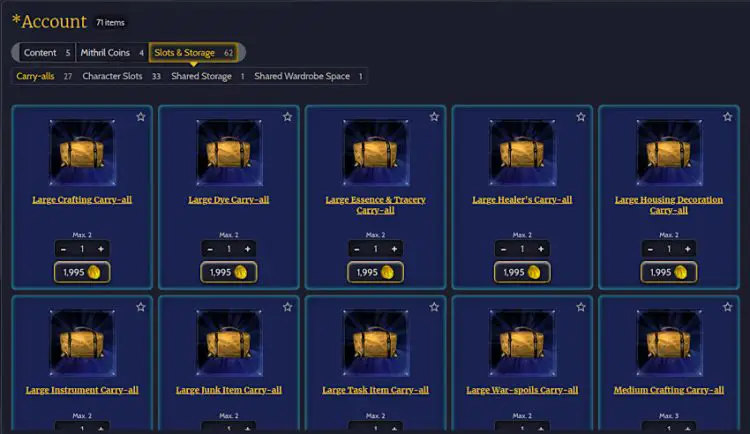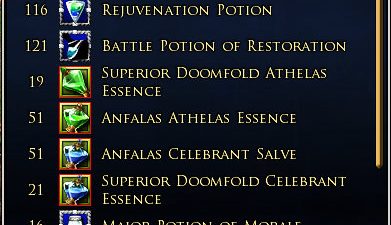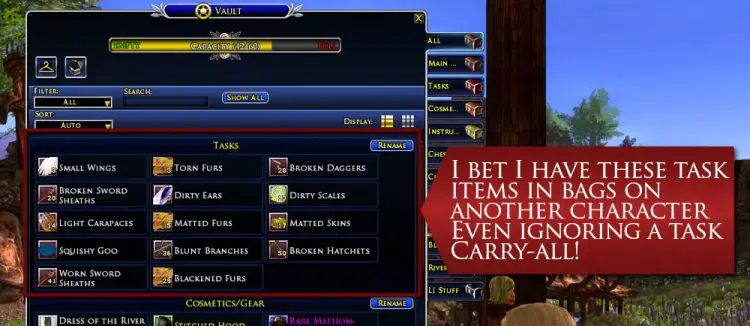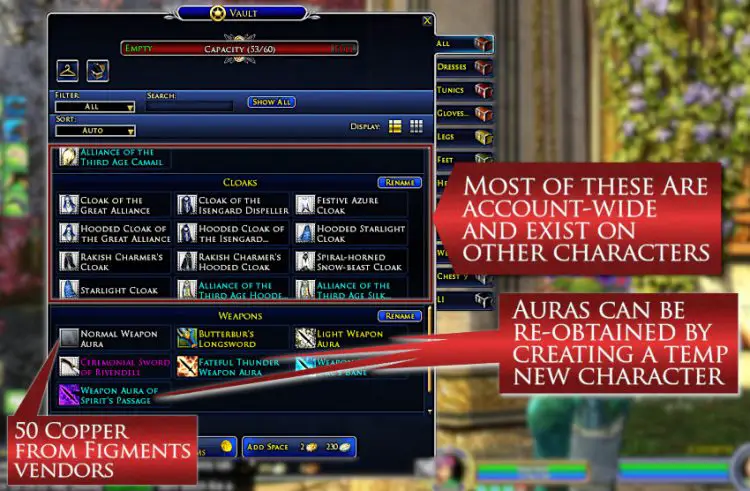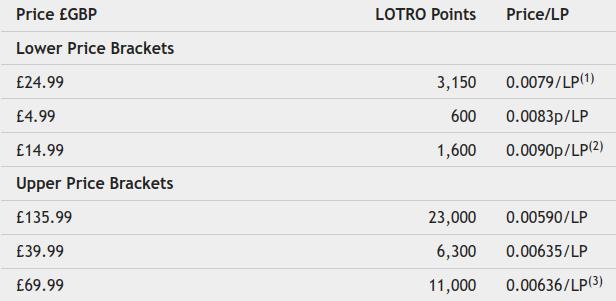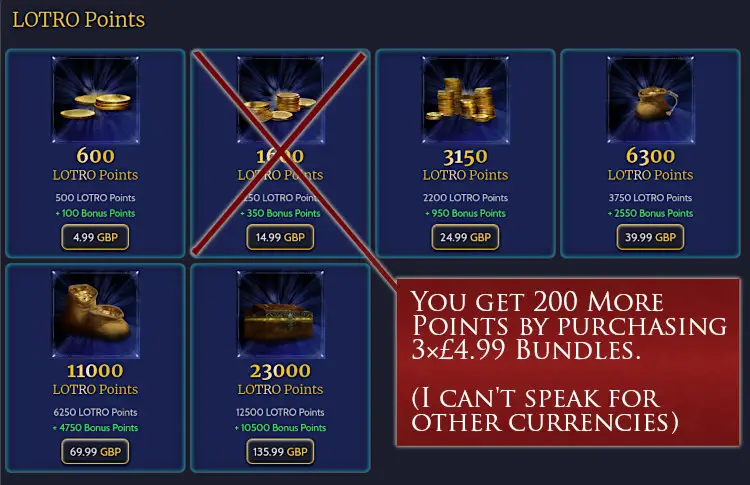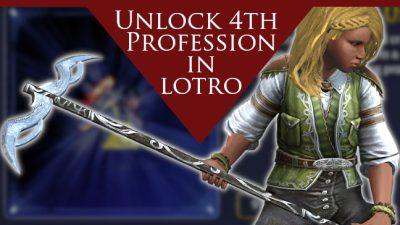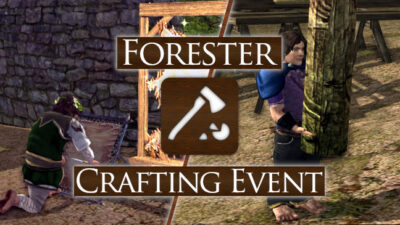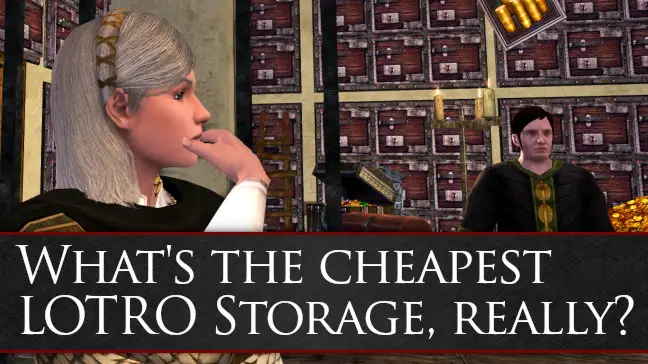
Post Sections ⇅
- How I Am Comparing Costs of Storage
- LOTRO Storage Options and Costs
- LOTRO Storage Price Comparison
- Other Considerations
- Inventory Management
- Reducing The Cost of LOTRO Points
In industry, Just in Time is a method of only getting materials at the moment they’re required. For LOTRO Storage purposes, we tend to apply a Just in Case method – holding onto everything on the off-chance we might, at some point in the distant future, need them! Maybe. In short, we’re hoarders. It’s an MMO thing.
And, while other games may offer two or three ways of storing our huge stashes of rocks, wood, skins, broken weapons and whatever else we have laying around, The Lord of the Rings Online has many options. You start off with some storage by default, but most types can be expanded. So, I wanted to help us all by looking at the cost of each type to find the best value for money. Let’s try that, shall we?
How I Am Comparing Costs of Storage
To make the costs understandable regardless of your own currency, I will be using their ![]() LOTRO Points value. To make them comparable I will be calculating their LP/Slot ratio.
LOTRO Points value. To make them comparable I will be calculating their LP/Slot ratio.
LOTRO Points’ value in real world currencies depends on various factors, not least Bonus Points sales. And I do not have time to go into the myriad foreign currencies.
The costs I am comparing are for when the types of storage are not on sale. Always look on the forums and social media for the upcoming LOTRO Store Sales.
So, as the currency of the store is LP, that’s what I’m using.
Mithril Coins Prices
Note: Where a storage type is in ![]() Mithril Coins, prices have been converted to
Mithril Coins, prices have been converted to ![]() LP. I will explain my calculation at that point.
LP. I will explain my calculation at that point.
Gold/Silver Upgrades
Some storage options can be extended using in-game ![]() gold and
gold and ![]() silver up to a point. The prices I’m comparing relate to when that is no longer an option.
silver up to a point. The prices I’m comparing relate to when that is no longer an option.
LOTRO Storage Options and Costs
With all those caveats made, let’s get into the detail! The storage options I will be exploring are:
…and a weird one at the end.

1. Inventory/Bags
Increasing your bags (or “inventory”) is one of the simplest ways to have more space. After all, that’s where your (non-pending) loot goes, your on-the-road food and potions and other misc items.
Unlocking bag upgrades is also account-wide, meaning every character benefits from it.
How to Expand Your Bags
Despite the UI calling them “bags”, they actually are “inventory” in the LOTRO Store. So you can find them by searching for “Inventory”, or under Account → Storage.
Cost
325 for 5 Slots →
32.5/slot (based on having two characters).
The more characters you have, the cheaper (per slot) this option becomes, because every character on the server gets the benefit of the unlock.
“Pure Free-2-Play” accounts – those who have not spent any real-world money in LOTRO – start with 2 characters. So 32.5LP/slot is the highest amount an extra inventory slot will cost with this method.
Pro’s:
✅ Simple and Easy
✅ Don’t have to be in town to access it
✅ The value of extending your bags becomes greater the more characters you have.
Con’s:
❌ Cannot be expanded with gold or silver.
❌ You need to mail items to other characters.
❌ You have to be very intentional on organising your bags the bigger they get.
2. Vault
Every character in LOTRO has a ![]() Vault they can store most types of items in. By default, a new character gets 30 free Vault spaces to use and this can be accessed via any Vault-keeper across Middle-Earth.
Vault they can store most types of items in. By default, a new character gets 30 free Vault spaces to use and this can be accessed via any Vault-keeper across Middle-Earth.
On top of that, the first few Vault spaces can be bought with ![]() Gold and/or
Gold and/or ![]() Silver. The first 15 slots are just 45×
Silver. The first 15 slots are just 45×![]() Silver, for example. (LOTRO Wiki
Silver, for example. (LOTRO Wiki![]() has a table showing the costs).
has a table showing the costs).
Vault Cost Scale
Ignoring the levels you can unlock with coin, there are two different prices for upgrading your Vault:
- For 135 and 150 slots the price is
 895 for 15 slots.
895 for 15 slots. - After that, you have to pay
 995 for 15 slots.
995 for 15 slots.
You can see the different calculations in the next tab or section. Or skip to Shared Storage!
Cost
895 for 15 slots: 59.7LP/Slot
The Math(s)
The Figure Used
The choice of ![]() 895/15 slots was taken from the median range per the sliding scale table on the Wiki
895/15 slots was taken from the median range per the sliding scale table on the Wiki![]() .
.
Average of Non-Coin Tiers
I calculated the cost of the non-coin tiers:
((9×995)+(2×895)/11) = 976.8 → 65.1LP/Slot
I then looked at the actual average:
((9×995)+(2×895)+695+595+495+395+295+195)/17 = 789LP = 52.6LP
If you then average those out the price is very similar to the median anyway!
(65.1+52.6)/2 = 58.85LP/Slot
Pro’s:
✅ Easily expandable early on for earnable gold and silver.
✅ Automatically easier to organise than bags, using the tabs provided.
Con’s:
❌ Unless you are VIP, you need to be in a town or a friendly camp to access Vault services.
❌ You need to mail items to other characters.
❌ Vault upgrades are character-specific, not account-wide.
Upgrading Your Vault in the LOTRO Store
When it’s not on sale you can find LOTRO Storage upgrades in the LOTRO Store: go to Account → Slots and Storage.
3. Shared Storage
Shared Storage ![]() is a feature only one other MMO I’ve played also had. It looks exactly like Vault storage, except all characters on that server can access it. You can open your Shared Storage at any Vault-keeper in Middle-Earth.
is a feature only one other MMO I’ve played also had. It looks exactly like Vault storage, except all characters on that server can access it. You can open your Shared Storage at any Vault-keeper in Middle-Earth.
It allows you to dump items in and, so long as they’re not bound to that specific character, they can be withdrawn by other ones.
However, unlike ![]() Vault Space,
Vault Space, ![]() Shared Storage has no free slots. Not even VIPs get some included. This means it must be purchased – either directly via the LOTRO Store or, occasionally, from inside other packs.
Shared Storage has no free slots. Not even VIPs get some included. This means it must be purchased – either directly via the LOTRO Store or, occasionally, from inside other packs.
How Much Is Shared Storage?
- First 20 slots:
 995 for 20 slots = 49.75LP/Slot
995 for 20 slots = 49.75LP/Slot - Next 80 Slots:
 595 for 10 slots = 59.5LP/Slot
595 for 10 slots = 59.5LP/Slot - After that:
 695 for 10 Slots = 69.5LP/Slot
695 for 10 Slots = 69.5LP/Slot
LOTRO-Wiki![]() shows there are 30 “levels” available.
shows there are 30 “levels” available.
Cost
The highest cost will be 65.6LP/Slot, or if you keep to a 100 slots, then the price is 57.6LP/Slot.
Shared Storage becomes more expensive per slot than the Vault from “Shared Storage XII” onwards.
Pro’s:
✅ Convenience: You can access Shared Storage via any Vault-keeper on all characters on a server.
✅ There is no need to mail items to other characters (of yours).
✅ You can organise items using tabs to keep things tidy.
Con’s:
❌ More expensive than Vault upgrades, after a few tiers.
❌ There are no free slots, and no gold/silver coins upgrades.
❌ After the first tier, you only get 10 slots/tier. You could just pay a few coins to mail 10 items between characters and not touch your LPs.
4. (Shared) Wardrobe
I didn’t think “Wardrobe” needed clarifying, but given LOTRO is still the only MMO I’ve tried that has this feature, I guess it does. The Wardrobe is available from Vault-keepers and can be used to store clothing items – whether that is combat stats gear or not, as cosmetics. This lets you dress any of your characters with any of the items in the Wardrobe regardless of their level. For most items, it is also regardless of their class too.
In one sense the Wardrobe isn’t storage. But it can be used as a “clothes cupboard”, especially if you don’t need or cannot use the original items anymore. This relates primarily to items that are bound to character, such as gear you’ve worn, or quest rewards that are Bind on Acquire![]() .
.
Cost
595LP for 10 Slots = 59.5LP/Slot
Pro’s:
✅ The Wardrobe can be accessed by all characters.
✅ You can free up other storage of items you’ve out-levelled.
Con’s:
❌ Can only be used for clothing and held items.
❌ You can only access it from towns, unless you are a VIP.
❌ You cannot “withdraw” an item from the Wardrobe, only remove it. If you remove it, but don’t have the original item, it’s lost until you can acquire it again.
5. Housing Storage
Housing Storage looks, feels and sort-of works the same as Shared Storage. The major difference is that you must be in one of your homesteads to access it. Initally, space upgrades can be acquired for silver and gold, but after that you have to use ![]() Mithril Coins. This is the only LOTRO Storage type which requires MC for upgrades.
Mithril Coins. This is the only LOTRO Storage type which requires MC for upgrades.
You can store character-bound items here, but only the relevant character can withdraw them.
How to Upgrade Your Housing Storage
I actually thought homestead storage would be more expensive per slot. But once I converted it from MC to LOTRO Points, it’s pretty good value!
The tricky thing here is that you have to pay for upgrades with ![]() Mithril Coins rather than
Mithril Coins rather than ![]() LOTRO Points. Goodness knows why.
LOTRO Points. Goodness knows why.
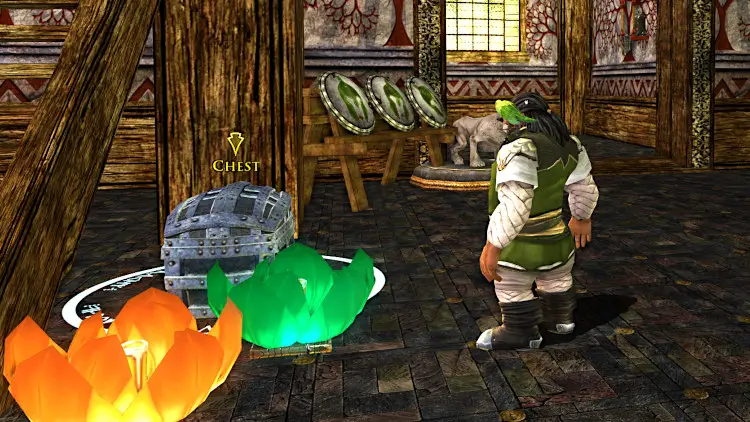
As with Vault and Shared Storage above, there are buttons provided to let you upgrade. The first few tiers cost some ![]() gold. But once you have unlocked 60 slots, they cost
gold. But once you have unlocked 60 slots, they cost ![]() MC.
MC.
Cost
100 Mithril Coins =
850LP for 15 Slots → 56.7LP/slot
Pro’s:
✅ available to all housing, including the standard/deluxe ones (those purchased and rented with gold/silver).
✅ It is shared across all your houses, which means you could put a ton of decorations in at one house and retrieve them to decorate another one.
✅ You can initially upgrade your housing storage capacity via gold![]() .
.
✅ All yours characters can easily access it by visiting your home.
✅ Like Vault and Shared Storage, you can organise your belonging by tabs.
Con’s:
❌ Annoyingly, you have to buy upgrades in Mithril Coins. But as it’s a round number of 100MC and there’s an MC bundle of 100, the currency is easy and quick to find.
❌ You have to go home to get anything, which could interrupt adventures. Because of this, you have no way of knowing if you own an item stored there, when looking to acquire others.
❌ Housing Storage is not accessible by Inventory Plugins. Nor is it part of the VIP Town Services tool. So you cannot quickly check if you have an item stored there or not.
Housing Storage or Decorations Carry-all?
We are about to discuss Carry-alls in depth, but this is a relevant question. Say you want to keep all your decorations in your homesteads’ boxes, which makes the most sense?
The answer: It depends on how many unallocated decorations you have hanging around. Here are the cost/slot of each of the carry-alls.
- Small Housing Carry-All (10 Slots): 129.5LP/Slot
- Medium Housing Carry-All (25 slots): 59.8LP/Slot
- Housing Storage Upgrade (30 slots): 56.7LP/Slot
- Large Housing Carry-all (50 slots): 39.9LP/slot
The Verdict
If you have 35 or fewer “spare” decorations, then Housing Storage is the cheaper of the options. That is because 1,995LP/35 = 57LP/Slot, making it about the same cost as 30 slots for a Medium Carry-all.
Once you have more than 35 spare decos, then the Large Carry-all is the way to go.
6. Carry-alls
Carry-alls are a type of “mobile inventory” bag, that, ironically, cannot carry all things. They can only carry a specific category of item. However, the bag itself can be transferred to your other characters on that server either through the mail or via Shared Storage/Housing Storage.
They can be acquired from the LOTRO Store, or may be included in a Carry-all “selection box” with expansions. This was the case with the Corsairs of Umbar Ultimate Fan Bundle.
Types of Carry-alls
These special bags can be used to store:
- Crafting materials
- Task items
- Junk items
- Decorations
- Instruments
- Traceries and essences
- Healing potions
- War-spoils (these relate to PvP)
One of their major advantages is that carry-alls can store items in much larger stacks (up to 5000) of items, where your inventory and other storage may limit stacks to 50.
Juicy-sweet, but Won’t Stay in the Carry-all
If you cook, this may be a helpful bit of insight from a follower of mine:
…My one complaint about the crafting carry all is that cooking fish won’t go in it.
Are Carry-alls Worth it?
Only you can decide, but I can share what I think. Here are costs per slot of each size of carry-all:
- Large:
 1,995LP for 50 slots = 39.9LP/slot
1,995LP for 50 slots = 39.9LP/slot - Medium:
 1,495LP for 25 slots = 59.8LP/slot
1,495LP for 25 slots = 59.8LP/slot - Small:
 1,295LP for 10 slots = 129.5/LP Slot!
1,295LP for 10 slots = 129.5/LP Slot!
Hopefully you’ve spotted the glaringly pricey tag of the small carry-all! If you only need to transfer 10 items between characters, then mail them for a few coins.
You can get 10 slots per character by upgrading their inventory bags for 650LP, significantly cheaper than a small carry-all.
It’s the Medium and Large ones that begin to compete really and which is of value to you will depend on how much stuff you have to put in them.
Large Healer’s Carry-all
Click/tap to expand.
Pro’s:
✅ Portable – can be mailed or transferred using Shared or Housing Storage.
✅ Great to keep things organised.
✅ You save space in your bags because carry-alls hold larger stacks than bags.
✅ Auto-gather: when you pick up an item that could go into a carry-all, relevant items can be automatically placed into the carry-all.
✅ You can do crafting while keeping items in the carry-all. Task items do not need to be transferred to your bags when turning them in at a Task Board.
✅ Carry-alls often come with Ultimate versions of expansion bundles.
Con’s:
❌ They are a pricier upfront cost. Do your maths vs other storage options to compare like for like.
❌ They can be either more or less cost per slot than other methods. Again, do your homework, kids.
❌ You have to have a bag for each item type.
❌ Plugins *still* cannot access the contents of carry-alls making inventory management difficult. I usually have to open three crafting carry alls and search each of them – assuming I’ve remembered to put them all in the same place already!
As of Update 40, you can rename Carry-alls! However, currently, that name does not show in Shared Storage or your Vault.
So, don’t buy a small carry-all ever! If you need to move 10 items, send them in the mail! If you want to store 10 items, then any other method we’ve discussed here is cheaper!
Pro Tip: if you put items in the carry-all that are bound to a character, other characters will not be able to use it. Only put unbound or Account-bound items in carry-alls if you intend more than one character to us them.
7. New Character
This may not be obvious as a storage method if you’re new(ish) to LOTRO. However, players often have what they call “Mules” – characters that exist solely to “carry” their stuff.
You see, each new character comes with the same number of bag slots as you have unlocked account-wise. They also begin with the minimum amount of Vault space for a new character plus any account-wide unlocks you’ve purchased since you started playing LOTRO.
This means the actual cost of that storage is totally dependent on how many account-wide slots you have unlocked already. But a new LOTRO account starts with 45 bag slots and 30 Vault spaces, meaning a minimum of 75 slots. And that is before using silver and gold to upgrade that character’s vault space.
Cost
![]() 595LP for 1 Character → 7.9LP/Slot (at most).
595LP for 1 Character → 7.9LP/Slot (at most).
Pro’s:
✅ You can extend vault storage with gold and silver.
✅ Insanely low price/LP
✅ The only other cost is time creating one (but you can use presets)
Con’s:
❌ This is great as “pure storage” but you have to log in and out of characters to move items between characters
❌ As with bags in-general, you will need to be organised to know where things are, especially if you use your Mule’s bag and Vault. Inventory plugins will not only work, but may be a necessity if you take this route!
❌ To stay organised you’ll have to remember to send unused materials back to your Mule Character.
❌ You will have to remember to give your Mule some coins so they can mail things over to extend their vault space and to mail items to other characters, if you do not have any Shared Storage left.
8. The Mail System
Don’t laugh too hard! While it’s been a long time since I saw someone mention this in chat, you can in fact “store” items in the mail. So, yes, I have heard of people using this bizarre method – no, I do not recommend it, nor have I ever done it.
This “method” involves sending a mail with 10 attachments to another character. That one then ignores that mail completely until the first one wants them back.
While it goes against the spirit of the game, I don’t think it breaks ToS rules. But I am also not recommending it. I just wanted to point out something people have done that was funny.
Pro’s:
✅ Mail waits a month before being returned.
✅ You only have to pay the cost of sending the mail in gold/silver
Con’s:
❌ You can only send 10 items at a time.
❌ There is no way of tracking it in-game and may even forget that you have. You’d have to manually record what was sent and to which character.
❌ As far as I know, no plugin can access mail.
LOTRO Storage Price Comparison
If saving money is the only consideration, and you can put up with admin annoyances, then a reverse ranking is possible. Putting these in order from worst-best.
This means, if price is your only – or major – motivation, starting a “mule” character is your cheapest route.
Other Considerations
Price is rarely the only factor we consider when purchasing things. Only when products are identical does price per unit become the only differentiator.
So, I wanted to summarise the other factors we’ve already touched on to consider when making your decision.
- Do you need to transfer items between characters? If so, how many and how often?
- How frequently do you, or your characters, need a certain item or resource?
- Do multiple characters need quick and easy access to it?
- Why was the character created? If they were made solely for musical performance, you may be fine with instruments stored in bags. If you have one primary gatherer (feasible under the new LOTRO Crafting System), then organising carry-alls for the crafting characters may work. Still, never buy a small carry-all!
- If you are a VIP, then the conveniences offered by some storage methods may not apply as much. The Town Services item may possibly negate any reasons for expanding your bags. And being able to send mail “in the field” makes trasferring between characters easier than waiting until you’re next near a mailbox, potentially reducing how much “set” storage you need.
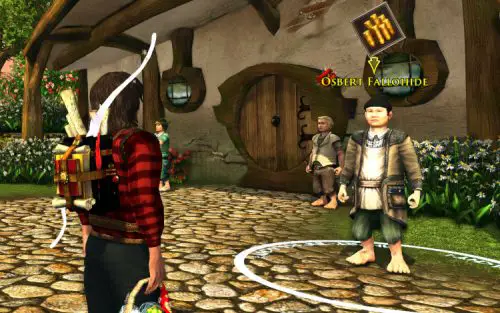
Inventory Management
Whatever you choose, the longer you play LOTRO the more storage you’ll need, and the more organised you may have to be.
You see, actually, the cheapest way to maximise your cost of storage is to use less storage. I realise that’s contraversial and counter-cultural! So, how can you do that?
Maximise Pending Loot
Pending Loot is a fantastic system I’ve never seen anywhere else. It’s a temporary hold of loot, and sometimes quest or deed items, where you can keep things before transferring them to your bags.
If you’re out adventuring and you have little bag space, make the most of Pending Loot. Any individual stack of items can remain there for an hour, up to a maximum of 50 stacks.
And if you have some space, but not much, just transfer individual items/stacks before they expire. It’s 50 free bag slots – use them. But don’t let the items time out either!
Use Filters!
The cheapest slot is the Filtered-slot. Think craft crit items, craft scrolls, junk essences such as evasion. What never drops, never takes up space.
What @Critters_Lotro is getting at here is make the most of loot filters. This ties into the Pending Loot, which is where you can filter future loot. If your character doesn’t want it, don’t get it by accident. If it’s something you don’t want any of your characters to get (e.g. lootboxes), then filter the item account-wide.
How to Clear Space
- Eliminate Duplicates
This mostly applies to disused armour and cosmetic items. If you have them in your Wardrobe and can easily obtain copies if you need them, ditch them. Use an inventory plugin (like Altholic or even TitanBar) to check for common ones. - Always Put Weapon Auras into Your Wardrobe
If you have one weapon aura, then it’s likely all your characters, present and future, will too. There’s no need to store them all in character vaults. - Normal Weapon Auras
If you have loads of Normal Weapon Auras not currently in use, you can delete them. Or, as one of my Patreon Crew said “Normal Weapon Auras can be sold for some copper (instead of deleting them). Not a lot, but every bit helps!”→ Should you need one in future, vendors like Rowan Raspberry, sell them for
 50 Copper!
50 Copper! - Look for Shared Appearances
Sometimes items in LOTRO have different names, but share appearances. A simple example is this Bronze Buckler. Check the Wiki, as they often have shared apperances documented.
- Merge Stacks Across Characters
For unbound, or account-bound items, you may be able merge stacks. Binding statuses can be messy – especially on certain consumables like potions, crafting scrolls and the like. But if you can merge stacks you free up space. Then you just need to make sure the right consumables are with the current character before venturing out. - Check Before Purchasing
Whether it is from LOTRO Festival Cosmetics, clothes from an Outfitter NPC or something from reputation vendors, ensure you don’t have it twice (or more!). - Be Ruthless on Hoarding
Are you a dragon? If the answer is “no”, then you can throw things away. And that is fine! In our family we usually have a “2-years not used” system. If you haven’t used an item in your outfits for a long time, get rid of it. I have loads of power potions. Do I remember when I last purposefully used one? Nope.
- Check and Ditch Expansion Items
Anything from expansions, you can ditch once you’ve added any to your character. Ensure characters have their specific perks unlocked, e.g. mounts, pets, titles, character frames. But, after the first character to unlock an expansion bundle, ditch copies of cosmetics (you can always make a new character if you accidentally bin an item you needed) and merge stacks of consumables. - Weigh up the costs only after deciding how many slots you need. And, ideally, after doing some of the stuff above!
Tips If You Own Carry-alls
If you have carry-alls, especially if you have two or more, then LOTRO plugins for inventory management may not be that useful to you. Instead you can try:
- Keep Carry-alls with the relevant character (or mule): if they’re a woodworker, keep one bag for wood items only with that character, for example. Ensure any wood gathered by other Forester alts is always sent to the relevant crafter.
- Have some shared storage, or use housing storage to keep your carry-alls in. That way, you can store them in categorised tabs.
Reducing The Cost of LOTRO Points
The other way to reduce the real-money cost of storage is to reduce the cost of ![]() LOTRO Points you purchase, rather than earn.
LOTRO Points you purchase, rather than earn.
I’m updating my LOTRO Points guide at the same time as writing this one, though it won’t be ready until next week. But here is a quick chart I made to see which bundles cost the least amount of real money per point.
For example, you get better value from buying 3×£4.99 bundles than 1×£14.99 bundle. (![]() 200LP extra, in fact).
200LP extra, in fact).
Hope this helps!
Other Money-Saving Tips
- Buy LOTRO Points when Bonus Points are on sale.
- Buy LOTRO Storage upgrades when they are on sale.
- Maximise the above by purchasing points on sale then waiting for storage to be at reduced prices.
- Do LOTRO Deeds for “free” points. It doesn’t reduce your
 LP cost, but it does reduce the real-world cost of your burgeoning virtual cupboards!
LP cost, but it does reduce the real-world cost of your burgeoning virtual cupboards! - Consider becoming a VIP. VIPs get 500 free LP per month, as well as bonuses and unlocks. It isn’t the cheapest way to acquire LOTRO points, but the extra allowances both during your subscription time and those that you keep afterwards may save you money.
Cost/LP of VIP
If the only thing you’re thinking about is LOTRO points, VIP is not the way the go.
Even the annual VIP cost (which is the cheapest way per month to subscribe) costs £79.99 and nets you 6,000LP, 1.3p/LP. If you bought these points on their own they would cost £50GBP.
LOTRO-Wiki![]() has an excellent features comparison table and that page also details what allowances are maintained
has an excellent features comparison table and that page also details what allowances are maintained![]() when you let your subscription lapse.
when you let your subscription lapse.
TL;DR Find the Right LOTRO Storage Options for Your Needs
The reality is that myself and many others use a variety of LOTRO storage methods depending on the situation. I hold different classification of cosmetics on different characters, use carry-alls for crafting and task items and still have my bags at 80% capacity!
I hope this was useful to you and helps you make the best decision you can over cost and functionality. Whatever you choose, make it work for you, and make sure you and others have fun questing in Middle-Earth.

